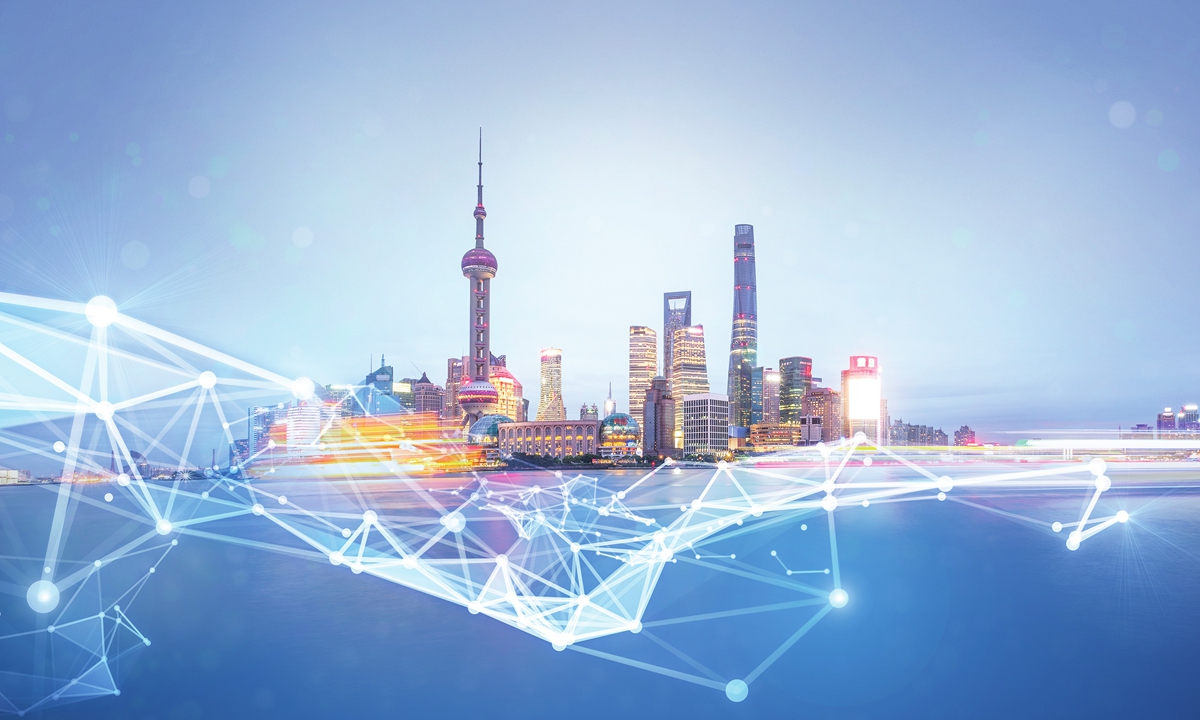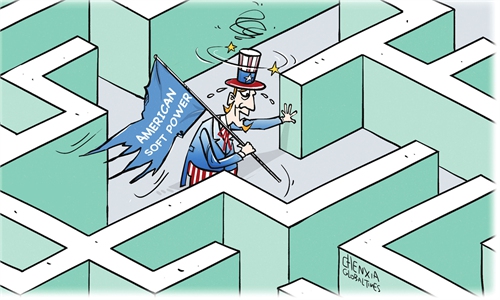IN-DEPTH / IN-DEPTH
Renowned brand survey reveals China's soft power ranks in world’s top 3 for first time
Fastest-growing influence

An automated production line runs in a new energy vehicle intelligent factory in Jinhua, East China's Zhejiang Province, on April 1, 2024.Photo: VCG
Brand Finance, the internationally renowned brand valuation agency based in London, recently released the "Global Soft Power Index 2024," which shows that the US and the UK have maintained their positions as the top two most influential countries in global soft power. It is noteworthy that China is the fastest-growing nation brand this year, surpassing Japan and Germany, and for the first time, ranking third in the soft power index, with the country's progress exceeding that of any other country.
Brand Finance has been tracking the performance of global soft power in multiple countries for five consecutive years, and this year's report is based on surveys of over 170,000 respondents from more than 100 countries, ranking all 193 member states of the United Nations for the first time.
What is behind the world's fastest-growing soft power? The Global Times recently interviewed Brand Finance's officials, as well as scholars and observers from various countries, to discuss how China's soft power is steadily improving and bringing benefits to the world.
Two pillars
According to Scott Chen, Managing Director China of Brand Finance, the agency defines soft power as "a nation's ability to influence the preferences and behaviors of various actors in the international arena - states, corporations, communities, public, and etc. - through attraction or persuasion rather than coercion."
Chen told the Global Times that the Global Soft Power Index is a research study, commissioned by Brand Finance, covering 193 countries around the world. With responses from more than 170,000 people in over 100 markets, the survey is also the most comprehensive and extensive field survey of its kind.
To conduct the fieldwork, in more developed markets, Brand Finance's established online research panels were used, Chen noted. "Each respondent was shown a random sub-set of nation brands - drawn from the 193 [countries] included in the Index - and asked about their familiarity. For countries about which the respondent had some knowledge, we obtained a detailed assessment of reputation, influence, and performance on 35 characteristics representing the core 8 Soft Power Pillars," he said.
In the 2024 Brand Finance Global Soft Power Index, China made the most significant advancement among all nations, rising from fifth to third place, and its overall score increased by 6.2 points from 65.0 to 71.2 over the previous year.
Chen explained that this growth is due to China's significant improvement in the two pillars of "Business and Trade," and "Education and Science."
"Our latest research finds that the Business and Trade pillars are crucial indicators of a nation's global influence. This directly reflects a nation's economic strength, innovation, and integration into the global market," Chen said.
Chen pointed out that in terms of soft power, Brand Finance found that a nation's ability to engage in trade effectively, maintain economic stability, and provide attractive investment opportunities is pivotal in shaping global perceptions.
In terms of specific indicators, China's performance is equally impressive. Since the first release of the Global Impact Index report in 2020, China has been ranked first in the world for being "easy to do business with" under the Business and Trade pillar, and has been No.1 for "future growth potential." In the education and science pillar, China ranks second in the world in indicators such as being a "leader in technology and innovation" and "invests in space exploration."
Chen noted that soft power holds immense significance for a nation as it enables it to exert influence, shape perceptions, and achieve goals.
"A nation's soft power, encompassing its culture and heritage, people and values, and international relations, enhances its reputation and fosters goodwill with other nations. By promoting such attributes, a nation can effectively engage with the global community and enhance its interests on the global stage. Soft power ultimately serves as a crucial tool, not just for diplomacy, but also for economic development, by attracting investment, trade, talent, and tourism to a nation," he said.
Multiple drive
Several years ago, back when BlackBerry phones were popular in the US, some of my friends wanted to keep up with the trend, yet couldn't afford them, so they bought Chinese knock-offs instead. During dates with their girlfriends, they were often too embarrassed to bring out their "fake BlackBerries." However, things are completely different now. "Made in China" is no longer synonymous with "inferior" or "counterfeit." Many Indonesians are using Chinese-made smartphones like Oppo, Vivo, or Xiaomi, and TikTok, whose user base has surpassed that of YouTube, Novi Basuki, a prominent Indonesian sinologist, told the Global Times.
The shift in Indonesians' perception of "Made in China" reflects China's enhanced soft power. Observers have pointed out that such enhancement is driven by multiple factors.
For example, in terms of electronics, China currently offers high-quality products at highly competitive prices, which continues to contribute to an enhanced perception of having "products and brands the world loves," for which the nation ranks 6th overall, Chen noted.
At the same time, Chen pointed out that while being ranked third overall in the index, China performs strongly in attributes such as "easy to do business with" and "future growth potential," with a prime example being the Belt and Road Initiative (BRI).
"As key objectives of the initiative, China's focus on promoting economic development, both domestically and among participating nations, especially in areas lacking infrastructure, has been key. Additionally, the BRI has played a role in facilitating international trade," he said.
In terms of the index of Education and Science, Chen noted that Brand Finance's latest research found that China has made significant strides in recent years. Underscored by various breakthroughs in areas like Artificial Intelligence, renewable energy, and space exploration, China has been able to cultivate an international reputation for its innovation capabilities and technological prowess.
The answer to this conclusion can be found in the cooperation between China and many countries in the world.
For example, in Brazil, people's views on China's soft power regarding are undergoing positive changes. Surveys conducted by the Pew Research Center show that about 70 percent of respondents from Latin American countries approve of China's technological development. Chinese cars, especially new energy vehicles (NEVs), are favored by Latin Americans for their excellent performance, cost-effectiveness, and technological advantages.
"In recent years, more and more Chinese companies have invested in Brazil, bringing not only capital but also advanced management techniques, creating a large number of job opportunities for the locals," Letícia, a Brazilian student majoring in international relations, told the Global Times.
According to statistics released by Chinese Customs, in 2023, China's exports of electromechanical products reached 13.92 trillion yuan ($1.92 trillion) with an increase of 2.9 percent, accounting for 58.6 percent of total exports. Among these products, the combined export of the New Trio, which includes electric vehicles, lithium-ion batteries, and solar cells, increased by 29.9 percent and reached 1.06 trillion yuan, breaking the trillion-yuan mark for the first time.
The Financial Times recently reported that thanks to excellent performance and affordability, the market sales of Chinese NEVs continue to grow, with obvious advantages over their counterparts from other countries. Mathias Miedreich, CEO of Umicore headquartered in Belgium, which is part of the NEV supply chain, stated that Chinese electric vehicles are good enough and provide what the market and consumers truly need.

A college student operates a robot at a robotics and artificial intelligence competition in Haikou, South China's Hainan Province, on June 13, 2023. Photo: VCG
Significant trendIn the 2024 Index, Brand Finance highlights a significant trend: hard power undermines soft power. "Going back to Brand Finance's definition of soft power, in that it revolves around influence through persuasion or attraction, rather than coercion, hard power - which is often associated with military strength - tends to undermine this approach by its very nature of coercion," Chen explained.
In my view, China's rise in the global soft power index reflects the world's appreciation for a country with great civilization and culture. It's also a positive response to the achievements that the country has made in technological innovation and development, Enrique Cornejo, a Peruvian political and economic analyst, told the Global Times.
Li Long, Executive Vice President of the Institute of Public Opinion and Social Governance at the South China Normal University, analyzed the three reasons why China's soft power has left a deep impression on the international community.
First, China embraces openness and inclusiveness. It has implemented a series of new policies and measures to strengthen its connections with the world. Activities such as trade, tourism, and cultural exchanges are becoming more frequent, and China continues to provide internationally shared public goods and services, promoting the construction of an open world economy.
Second, it values technological innovation, a core element of developing new productive forces. The country is enhancing its technology and capacity for independent research and development.
Third, China calls for cooperation and mutual benefit. As a responsible major country, China has always adhered to the principles of peaceful development and mutual benefit, actively promoting peace and development in the international community.
"Peruvians believe that China's soft power manifests a friendly value system, which distinguishes it from other influential countries, whether in North America or Europe," Juan Carlos Capuay Chávez, former Peruvian Ambassador to China, told the Global Times.
Julien Segbo, Director of the Confucius Institute at Benin's University of Abomey-Calavi, said that more and more African students are choosing to study in China. "It's not only because China offers a variety of scholarship programs, but also because the quality of higher education in China is gaining wide recognition. Like many classmates, I came to China for education. I have gained professional knowledge here, broadened my horizons and experienced the charm of different cultures."
According to Al Gomhuria, a state-owned Egyptian Arabic language daily newspaper, China's economic and trade cooperation with Africa has driven the development of local African companies and increased job opportunities.
China's educational aid projects have improved education in Africa, providing the younger generation with broader room for development. The friendly cooperation between China and Africa has not only promoted the economic development of both sides, but also deepened the emotional bond between the two peoples.
Analysts pointed out that although some Western media often report on China-related news from the perspective of Western values and political positions, leading to a higher proportion of critical reports on certain Chinese policies and actions.
However, currently, many countries, especially in developing countries, recognize China's soft power and influence. With the deepening of globalization and the diversification of information channels, more and more people are beginning to understand China through various means, including direct visits to China, participating in cultural exchange activities, and social media. More and more people are looking forward to China's soft power accelerating further.

Photo:VCG
Zheng Kexin also contributed to this story

